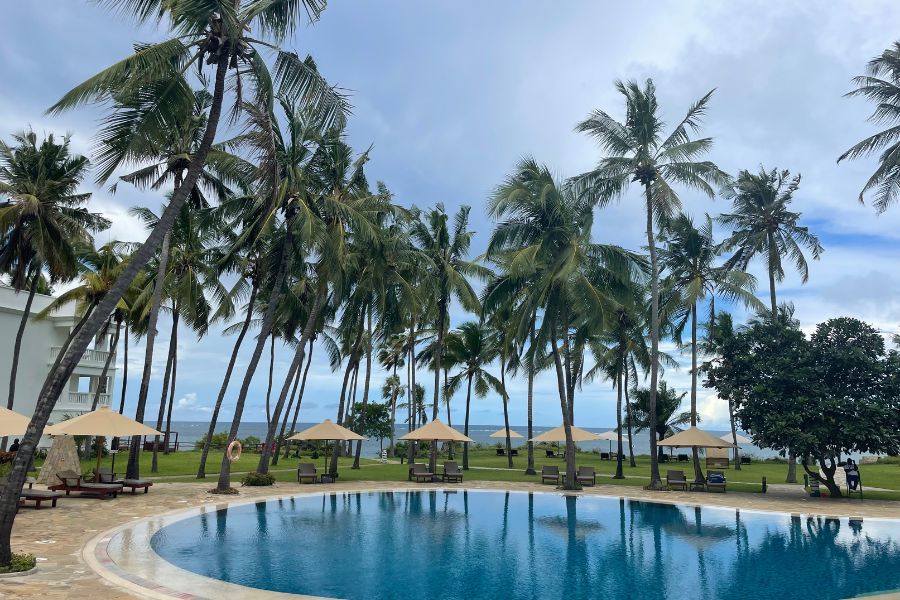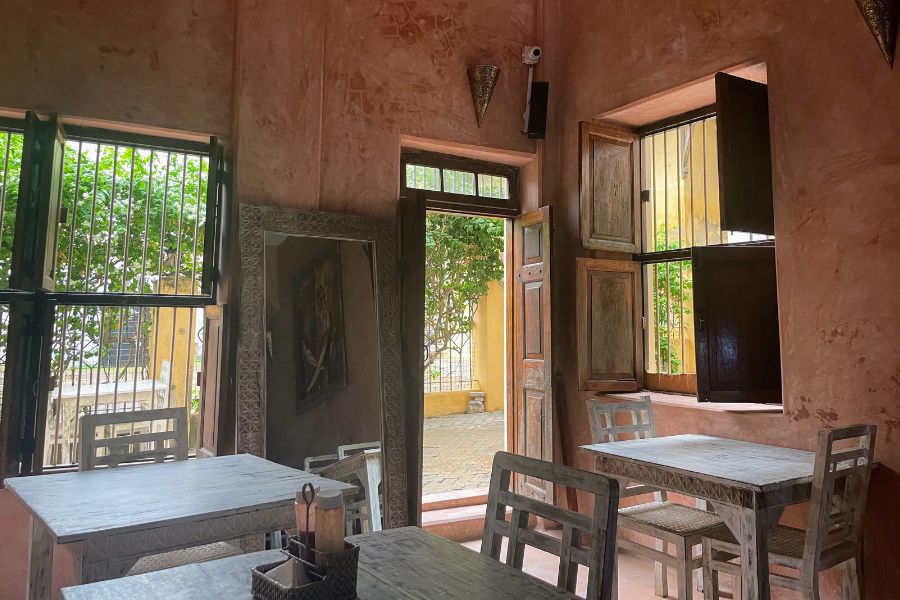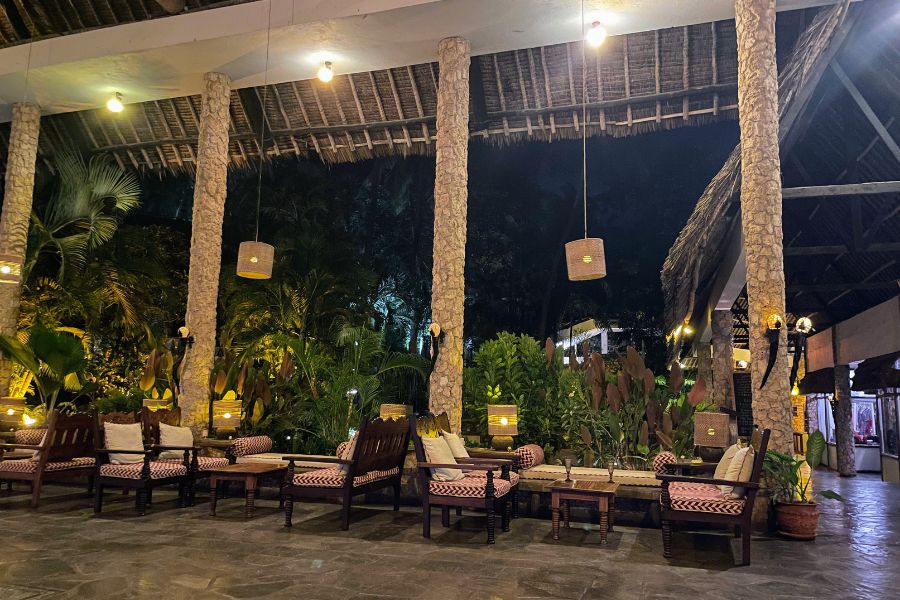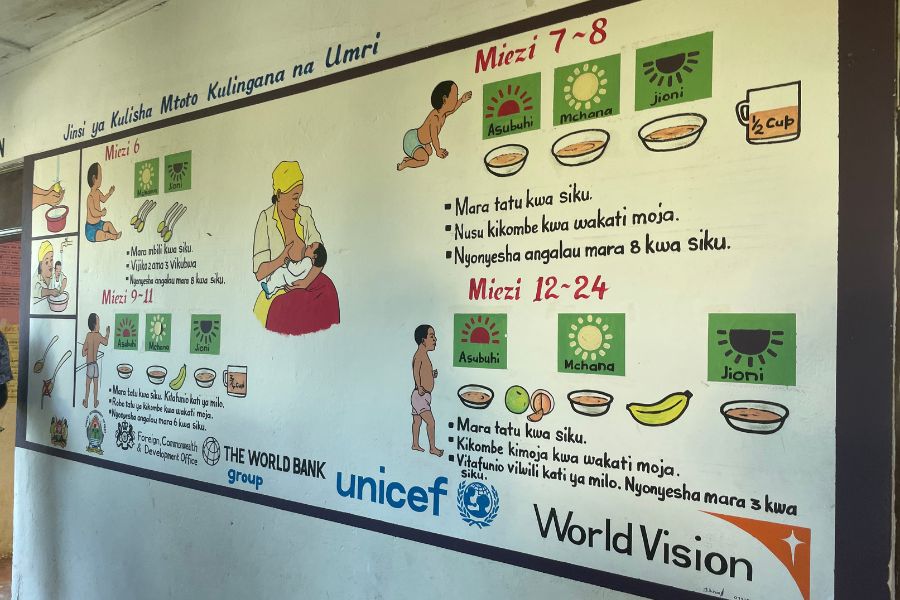This piece is part of my From the Window Seat series, where I take you along and give you a first-person perspective into my travels. In this series, I share my daily rhythms, once-in-a-lifetime experiences, and reflections on travel from a journal-style vantage point, giving you a window into wherever I am in the world. Thanks for coming along for the ride, and let me know what view you want to see From the Window Seat next time!
When I was told that I would need to go to Mombasa, Kenya for a work conference, I was thrilled. I’d never been to Kenya before but it was very high on my list. I knew immediately that I wanted to maximize my time in Kenya by adding on some extra solo budget travel time. However, I’d need to be strategic to work around my remote work schedule and keep it affordable.
I’m a budget traveler at heart, which usually means hostels, public transportation, and going with the flow, but these can be challenging to meld with the ultra-professional image required by work travel. Would it be possible to mix solo budget travel and work travel, or was I asking for disaster? I was about to find out.
Adding solo budget travel time to my work trip
Traveling for work meant free plane flights and a per diem stipend meant to cover hotel, food, and transportation during the days of the conference. However, I was on my own for anything extra. A quick search on Google Flights told me that travel between Côte d’Ivoire and Kenya was no joke. There were only 4 direct flights between Abidjan and Nairobi each week – if I skipped the direct flights, my total travel time doubled from ~10 hours to ~20.
Working around these flights meant that it made logical sense to arrive a weekend early for the conference, but anything beyond that was up in the air. Given that most of my role was remote, I gathered my assertiveness and asked my boss if I could stay an extra week on my own dime and work from Kenya. After a bit of back and forth, my request was approved – I was on my way to a hybrid work + solo budget travel trip.
Upon approving the request, my boss expressed concern over the expense I would bear. “Hotels out there can be $200/$300/night”, she said, “Your extra time could get expensive fast”. Somehow, on a work call it felt inappropriate to tell her that I wouldn’t be staying in said $300/night hotels. Instead, I’d be crashing primarily in hostel dorms, sharing bunks with fellow travelers for a fraction of the price. I was 25, making a fraction of her salary, and still living my young travel dreams. It shouldn’t have been surprising that my boss and I would have different travel styles. However, somehow even as I write this, I find myself hoping she never finds this.
Mixing luxury hotels with budget hostels
With my dates and flights decided, accommodation was the next piece of the puzzle. When most of my colleagues travel, they stay at the conference venue for convenience. However, a quick Google of the conference venue told me that staying there would exceed my nightly stipend. My goal was to not only have my conference day expenses fully covered by the stipend, but hopefully have a bit left over to supplement some of my extra travel days as well.

However, I knew that at least for the days of the conference, I’d need to change up my travel style. I might not stay in the luxe conference venue, but staying in a hostel by night while I suited up to present to the African Union by day felt wrong. In addition, I knew I’d likely be the youngest person at the conference by far. As a young woman in a professional landscape, I often feel the need to overcompensate with professionalism to be taken seriously.
As such, I settled on a compromise: for the extra time before and after the conference, I’d work remotely from hostels, never exceeding $20/night for accommodation. For the nights of the conference, I’d select a lovely-looking lodge near the conference venue. It would be fancy enough that I wouldn’t feel as though I had to hide if fellow conference attendees asked me where I was staying, but priced at a more swallowable $100/night.
Packing for both professionalism and hostel life
With my flight approaching, I dragged out my suitcase to pack. My parents bought my carry-on suitcase for me at Costco before I left for my freshman year of college. Nearly 7 years and only one broken zipper pull later, it’s taken me on countless trips, both for work and fun.
At my last job, I traveled frequently and had my Monday-Thursday packing list down to a science. However, as I stared at my suitcase this time, the list was a bit different. Sure, I needed my classic professional kit, but I’d be spending more time in hostels than hotels. Alongside my blazer and slacks, I tossed flip-flips and a thin travel towel for hostel showers. More than anything, though, I couldn’t stop staring at my suitcase itself. While I couldn’t bring myself to show up to a work conference with a backpack, it also felt ridiculous to show up to a hostel with a roller bag.

From hostel to hotel
The first leg of my trip went off without a hitch. I arrived in Mombasa’s Old Town on a Saturday morning and quickly slipped into my solo travel rhythm over the weekend. As Monday rolled around, I sought out more stable wifi and found that my hostel, Tulia Old Town, was a surprisingly hospitable place to work remotely.

By Tuesday evening, it was time to head about an hour up the coast to Shanzu, where the conference would take place. I threw my roller bag in the back of a tuk-tuk and motored up the coast, ready to swap the nonexistent water pressure of the Mombasa hostel for the multiple swimming pools of my Shanzu hotel.
The hotel turned out to be a fantastic home base during the conference. It provided socially acceptable luxury and was only a 10-minute drive from the conference center. There were even a few other conference attendees at my hotel, which told me that I’d chosen wisely in my endeavor to fit in.

To explain or not to explain solo budget travel
At the conference, the first few times that I was asked when I would be departing Kenya, I told the truth, that I was actually heading up the coast for a week to work remotely. This was immediately followed by borderline-scandalized questions of whether I was doing that alone, and when I confirmed, people didn’t quite seem to know what to say. I slowly shifted away from the truth and towards a vague and noncommittal answer that didn’t invite further questioning.
When a woman sitting near me was asked the same questions and replied that she was heading to the same town as me to meet up with her husband, the conversation flowed effortlessly. But as soon as I revealed I was traveling solo, it was as though the veil on my relatability as a fellow professional was drawn back, and the incongruity of my age and gender were magnified against the screen of not just solo travel, but also my presence at the conference more broadly.
One night as I prepared to take a dip in one of my hotel’s swimming pools, I noticed that the only other person swimming was an older woman, perhaps in her 60s. After a few minutes in the pool, she came up to me with an opening line I’d never gotten before: “Hi, are you a flight attendant?”.
Over the next few minutes, I learned that she had been a flight attendant when she was my age. During her many flights in and out of Mombasa, this hotel had been where flight attendants stayed during longer stopovers. She told me about how she eventually met her husband, a pilot, at this very hotel. Several years later, on a trip back to the hotel, he’d proposed in the very place where they’d met. Many years later, they still bring their children back to the hotel for family vacations. On this particular trip, she was finally here solo.
As her story unfolded, I realized that this was perhaps the one person that I would meet on this trip to whom I would have no reservations about telling my solo budget travel plans. As I expected, she responded with curiosity and encouragement, not reflecting the least bit of judgment back to me.
Getting to Kilifi Part 1: A budget travel plot is hatched
My post-conference destination was Kilifi, a tiny beach town another hour and a half north of Shanzu. I was planning to go up on Friday evening after the conference was over. While my budget traveler heart told me to find a matatu, a communal minibus, the solo female traveler piece of my brain decided that a taxi might be the way to go given that I’d be arriving after dark. However, a taxi would cost me upwards of $40, so I kept my eye out for other options.
Luckily, as Thursday’s conference activities wrapped up, the host mentioned an optional field visit to a village on Friday afternoon. It was north of Shanzu, she said, in the same county as Kilifi town. This felt like a perfect solution to my $40 taxi problem: if the field visit could get me close, I could get off on the way back, and take a much cheaper taxi to my hostel for the night.
After the announcements were over, I found the woman in charge of organizing the field visit and asked her for more specifics about the destination of the field visit. I told her I was heading to Kilifi after the visit – would it be possible for me to bring my suitcase and be dropped off somewhere closer to Kilifi on the way back? She assured me that while we wouldn’t be going directly through Kilifi, we would get close, and I could absolutely jump off at an intersection closer to Kilif on the way back. At last, I thought: the perfect convergence of business travel and budget travel.
Getting to Kilifi Part 2: Target identified
On Friday, I brought my packed suitcase with me to the conference venue, and when it was time for the field visit, I snagged it from the luggage room and hauled it to the waiting busses. I intentionally got on early, working with the driver to find a space to stash my suitcase near the front of the bus. No one else had brought their luggage, and I felt weird about being the only one.
On the way to the field visit, I tracked our path on Google Maps and was excited when we turned off the main road only 20 minutes or so from Kilifi. The intersection was teeming with tuk-tuks and bodas waiting for passengers and would be a perfect place for me to get out on the way back.
The field visit was equal parts educational and entertaining, with tours of health clinics and data collection centers paired with first-person accounts of the impact of the programs. One “community champion” who now led a curriculum on communication-based parenting styles told us that she had been won over by the program when she realized that better communication with her husband meant a better sex life – she was now dedicated to sharing what she had learned with anyone who would listen. Was this exactly the outcome the funders had imagined? Probably not, but it was the most effective community ownership I’ve ever seen, so who’s to argue?

Getting to Kilifi Part 3: A subtle commandeering
As the field visit wrapped up and we loaded back into buses, I did a quick sanity check and asked the driver to confirm that we were taking the same route back. He looked at me confused and said that no, we were taking a different road back, looping our way away from Kilifi. With “what have I done” alarms beginning to sound quietly in my head, I got off the bus and sought out the coordinator who had told me I could bring my suitcase in the first place.
After I explained my concern, she exchanged some fast phrases with the bus driver in Swahili. She explained that there were two routes back, one going the way we had come, and the other in a loop. Our bus could double back the way we had come, while the other busses could continue in the loop. I gave a half-hearted protest, hating to be the reason for a reroute, and thanked her for her help.
As we got settled on the bus, though, the other passengers got wind of our redirection. Suddenly everyone was talking at once. Why were we taking a different route? Was it faster? Slower? Were we all going to the same place? Some people demanded to get off of our bus and onto the busses that were going the loop route, leading to a mini exodus from our vehicle. I shrunk in my seat and tried to be as inconspicuous as possible, hating that I was the cause of this commotion.
Finally, as the bus got moving again, the chorus of “Why?” got too loud. Eventually, the coordinator told them we were dropping someone off. This quickly turned the “why?” to a “who?” and all eyes were on me as I pointed to the suitcase that everyone had ignored on the way to the field visit.
Thus began the unavoidable onslaught of questions: where was I going, who was I going with – no, I wasn’t really traveling alone, was I?? I tried to answer with grace, keep it light and vague, and placate the bus, but given that I was the reason for our unorthodox route, I owed them a bit of an explanation.
How to talk about solo female travel
When I travel solo as a young woman, I’m often caught in a catch-22 around how I talk about it. Every safety tip you will ever read on solo female travel will tell you that under no circumstances should you tell people you are solo traveling. Heck, even safety tips for non-traveling women tell us that we should never tell men we don’t know that we live alone, never tell them where we live in the first place, and never give too many details on what our daily routines look like. It logically follows that while alone in an unfamiliar place, it may not be the best of ideas to be flagrantly open about my travel plans and travel style.
However, every time I talk about solo female travel, the vast majority of women (and even men) tell me things like “Oh, I could never do that”, or “Wow, that’s so unique”. To them, my choices lie somewhere in the curiosity-laden grounds between scandal and impossibility. I know that at least some piece of this reaction stems from the quiet space that solo female travelers so often occupy – when we keep ourselves unseen, we may keep ourselves safe, but we also preserve the perception of rarity.
I know that if you do the math, solo female travel is vastly less common than solo male travel or group travel. Even so, every time I get a surprised reaction I want to shout “We are here! I am not the only one! This is not particularly abnormal, we just make ourselves invisible!”, as though that’s not commentary that could be applied to so much of the female experience, travel or no travel. And so when I’m on the road, in the same breath that I use vague, noncommittal language to protect myself, it feels wrong to add to the underground silence of solo female travel.
Getting to Kilifi Part 4: The placating presence of men
Back on the bus, we steadily approached the intersection where I would disembark. A country representative from Mozambique filled the time by telling me about her recent travels to Nairobi for a different conference. During the 4-day conference, she was so concerned for her safety that she didn’t leave the conference center a single time. She told me that on this trip, she had only left the hotel in hotel-ordered cars. Uber, tuk-tuks, or other public forms of transportation were simply out of the question – much too risky. I didn’t tell her that I’d be traveling to Nairobi later in my trip, or that I certainly wasn’t intending to lock myself in a hotel room once I was there.
As we slowed by the intersection where I was to depart, she suddenly looked at me aghast. “You’re getting out HERE?? Who is picking you up? You’re just going to get into a tuk-tuk???”.
I was blessed at the last minute by a man from the back of the bus who had stayed silent the whole ride. He suddenly stood and informed us that he was also planning on staying in Kilifi, so would be disembarking here as well. Pulled too tautly between my professional persona and my solo female traveler persona, I didn’t have time to doubt him or his motives. Instead, I turned to the Mozambique representative, who was instantly placated by the presence of this man.
The fellow disembarkee and I easily found a tuk-tuk, and his native Swahili eased the negotiation process as dusk fell around us. Since we were going in the same direction, we shared the ride. He would hop out in the town center, and I would continue to my hostel for the night. As he told me about his work as a photographer for the Kenyan Ministry of Health, I was both grateful for the ease that his presence afforded me in exiting the bus in a socially acceptable fashion, and resignedly frustrated that inevitably, his presence is what it took for my travel choices to be valid.
Why can’t solo budget travel be professional?
Throughout the business section of my trip I had been so hesitant to tell anyone that I was solo traveling afterward. Even when I revealed my solo travel plans, I absolutely never mentioned that I would be staying in hostels or solo budget traveling. Taboos around money and finances are nothing new, but I had never considered so acutely the way in which budget choices, or lack thereof, correspond to professionalism outside of the workplace.
In a workplace context, people expect the person in the fanciest suit to be the most senior person in the room. However, once you leave the office, this doesn’t stop. An expensive car and a nice house in a pricey neighborhood are expected. And when senior officials or celebrities use public transportation or have somewhat normal-person-seeming homes, it becomes a news story.
Of all of the activities that I choose to do in life, few make me more proud of myself than solo budget travel. Having the confidence and wherewithal to navigate new and unknown situations, thrive in challenging and often uncomfortable contexts, and carefully make the most of a limited budget are all skills and virtues that I’ve honed through solo budget travel. They are also all skills that could be plucked directly out of this post and pasted into bullet points on a professional resume without changing a single word.
I’m still not sure how to balance the lines that I walk when I solo budget travel, between extolling the virtues of solo female travel and preserving my sense of safety, between honesty and pride in my endeavors and the knowledge that these choices age me down and even deprofessionalize me in the eyes of my peers.
For me, solo travel is all about finding the magic and creativity that come when you’re willing to get uncomfortable. If mixing solo budget travel and business travel means mildly scandalizing folks twice my age as I subtly commandeer a chartered bus to save a few bucks, all I can say is this: I’ve done it before, and without a doubt, I’d do it again.

Love it
Trula, I loved reading this and hearing more about both your travels as well as your internal process. You go girl!!!!
Trula, you have an adventurers heart. I really enjoy reading about your travels and your life and the process of discovery.
Thanks for sharing !